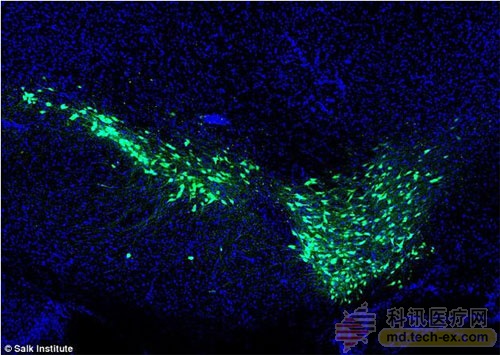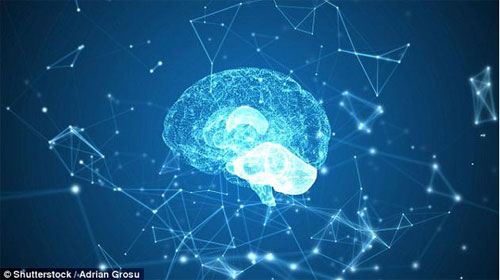Release date: 2017-03-21

After studying the behavior of mice, scientists point out that dopamine can have a major impact on the likelihood that we will act or make decisions in a short period of time. The picture shows the mouse brain, blue represents the nucleus of a single cell, and green represents dopamine neurons. 
Scientists point out that dopamine can precisely control the decisions we make in a short period of time. As long as we measure the level of dopamine in the brain before making a decision, we can accurately determine the outcome of the decision.
According to foreign media reports, imagine that when you were eating a buffet, you saw a piece of pizza, but in the last second, you took aim at a piece of steak and quickly clipped it to the plate. Scientists at the Salk Institute for Biological Research in San Diego, USA, found that perhaps dopamine gives you the ability to make decisions in an instant.
After studying the behavior of mice, scientists point out that dopamine can have a major impact on the likelihood that we will act or make decisions in a short period of time. This finding may help patients who have difficulty controlling body movements, such as Parkinson's patients and OCD patients.
Dopamine is a neurotransmitter that allows us to get pleasure from gambling, sex and drug use. Now researchers have found that the substance can also influence our decision making.
Scientists point out that dopamine can precisely control the decisions we make in a short period of time. As long as we measure the level of dopamine in the brain before making a decision, we can accurately determine the outcome of the decision.
In addition, changing the dopamine content in the mouse brain can also influence its decision making.
"Because we can't handle two things at the same time, the brain needs to constantly decide for us what to do next," said Xin Jin, assistant professor of molecular biology at Saxophone. “In most cases, the brain doesn't communicate with specific muscles and directly controls these decisions, which is what my lab wants to know more about.â€
In experiments designed by researchers, mice need to make quick decisions and win prizes. They were kept in a special cage with two levers in the middle of the cage and a feeder in the middle of the lever. After each test, the joystick will retract and reappear after 2 or 8 seconds. The mice quickly realized that if the joystick reappears at a short interval, it is necessary to press the left lever to get the reward. If the joystick reappears after a long time, you need to press the right lever.
This experiment designed a simplified version of the selection scenario for mice. They will come to the left of the cage at first, but if the joystick does not appear after a long time, they will be transferred to the right side of the cage.
“This experimental design has led us to think about how the brain has undergone changes in the process of changing decisions,†said Dr. Hao Li of the Salk Institute.
During the experiment, the researchers used a technique called "rapid scanning cyclic voltammetry" to implant electrodes thinner than human hair in the brain of mice to determine the level of dopamine in the brain. The technology measures at very high frequencies and captures rapid changes in chemicals in the brain.
The results showed that changes in dopamine levels in the brain of mice were closely related to decision making.
To verify that dopamine levels are responsible for, and not just related to, decision-making changes, the team also used light-controlled gene technology in molecular engineering to control dopamine levels in mouse brains using real-time beams. It was found that by simply increasing or decreasing dopamine, the mice were turned from one side of the control rod to the other.
Professor Jin pointed out: "We believe that if we can restore the dopamine mechanism in the brains of Parkinson's, obsessive-compulsive patients and drug addicts, it may help them to better control their behavior. This is our way to achieve this goal. Significant progress."
Source: Sina Technology
Cardio-Cerebrovascular,Felodipine Tablets,Telmisartan Capsules,Nicergoline Tablets
Shandong Qidu Pharmaceutical Co., Ltd. , https://www.qdyypharma.com